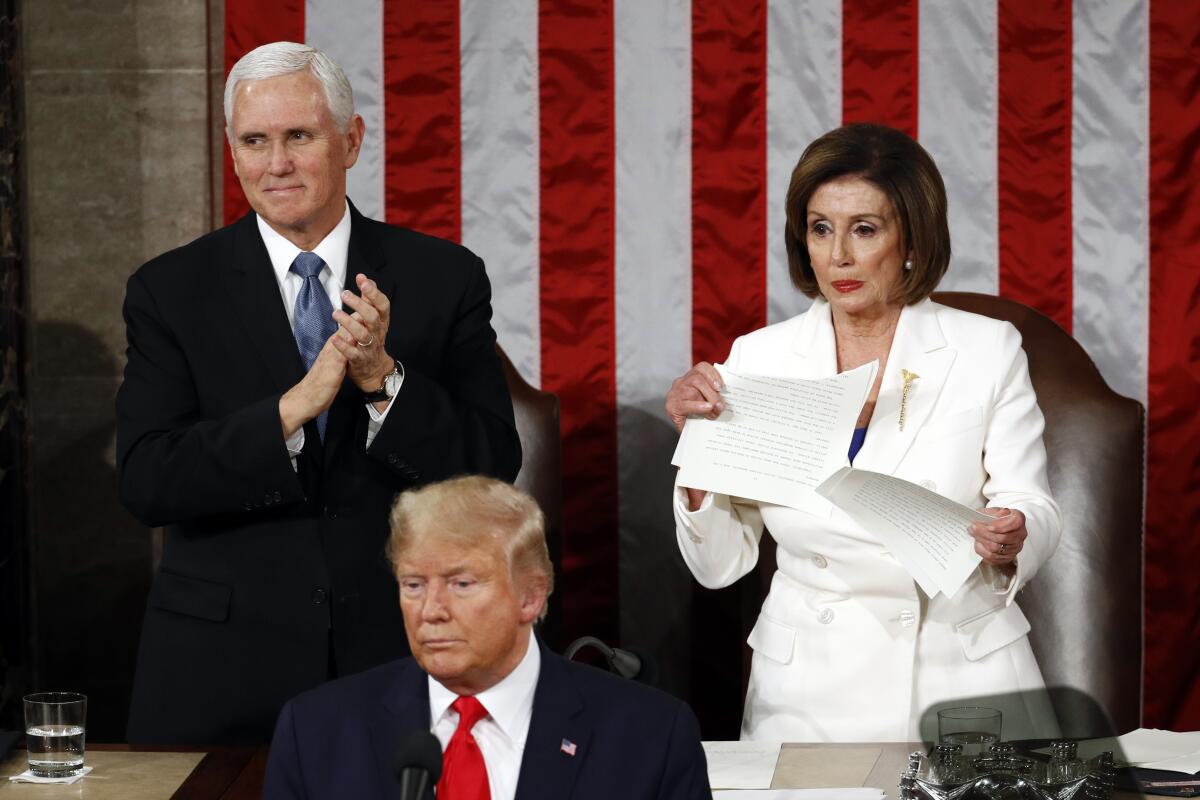News Analysis: Trump’s impeachment and acquittal please partisans on both sides

WASHINGTON — Minutes after President Nixon resigned in disgrace and left the White House in August 1974, Gerald R. Ford was sworn in as president and sought to heal a traumatized nation, declaring, “Our long national nightmare is over.”
Although President Trump was acquitted by the Senate on Wednesday and allowed to remain in office, a similar attempt at reconciliation or closure is difficult to imagine.
Americans are instead left with toxic images from Trump’s State of the Union speech to a joint session of Congress on Tuesday, with Trump refusing to shake House Speaker Nancy Pelosi’s outstretched hand, and Pelosi later publicly ripping up the text of Trump’s speech in disgust.
A nation stewing with partisan fury has grown angrier, with Democrats bitter over a president they believe got away with abusing his office and Republicans incensed that he was impeached at all.
The final Senate votes reflected that vast gulf: No Democrats broke ranks, and only one Republican — Sen. Mitt Romney of Utah, the GOP’s 2012 presidential nominee —condemned what he called “an appalling abuse of the public trust” and voted to convict Trump on one of two articles of impeachment.
Yet many caught in the maelstrom of the last 4½ months — first in a rancorous House impeachment inquiry and then an acrimonious Senate trial — believe their party emerged victorious, exciting passion among their core constituencies.
“The politics in America are so polarized right now that I think both sides probably think they’ve done well politically,” said Tad Devine, who served as a senior advisor to three Democratic presidential campaigns. “They’re talking to entirely different audiences.”
The lack of a consensus has left the long-term lessons of this impeachment unsettled, at least until Trump and Republican lawmakers face the voters in November, and perhaps beyond that.
Nixon resigned before he was impeached over the Watergate scandal after public opinion turned against him and senior Republican senators warned they would vote to remove him from office if he did not leave first. In 1999, President Clinton survived impeachment, publicly apologized, and saw his popularity rise as Americans largely decided he should not be removed for lying about an affair with a White House intern.
But Democrats paid a price the following year when Clinton’s vice president, Al Gore, lost the presidential election to George W. Bush by a razor-thin margin ultimately decided by the Supreme Court.
“In the Nixon case, the president left office ... because of a national bipartisan sense that he should,” said Timothy Naftali, founding director of the Richard Nixon Presidential Library and Museum in Yorba Linda. “So there was a resolution of the scandal, as much as you can have in a complex republic. There was a consensus he needed to be removed before the end of his term. That consensus doesn’t exist today.”
No president before Trump has been impeached and then gone on to seek reelection. That gives Americans a chance to weigh in more directly, but it also widens the political and social divisions that have defined the turbulent Trump presidency.
“What’s at stake is not just Trump’s reelection or the future of the Republican Party,” said William Howell, a University of Chicago professor who has written extensively about executive power. “It’s about Congress’ ability to check presidential power.”
Historians, constitutional scholars and Democratic lawmakers say Trump’s acquittal in the Senate has almost certainly weakened the authority of Congress to oversee and provide a check on the executive branch. Even if Trump isn’t reelected, future presidents are likely to cite his precedent in refusing to honor congressional subpoenas, blocking witnesses and evidence, without consequence.
Not only did the stonewalling thwart House investigators during the impeachment inquiry, but the Trump administration has also regularly declined to attend routine oversight hearings in Congress.
“Unfortunately, yes, that’s the precedent and everybody seems to love precedents more than they love laws,” said Brenda Wineapple, author of “The Impeachers: The Trial of Andrew Johnson and the Dream of a Just Nation.” “Suspending the issue of right and wrong, when people get away with things, it’s incentive to do it again.”
The result, in some ways, is likely to be the reverse of the post-Watergate experience.
After Nixon resigned, Congress moved to sharply curtail the president’s authority and create direct oversight of U.S. intelligence agencies for the first time, among other reforms. But many of those changes have weakened in recent decades as Congress has handed more power back to the White House, giving Trump a freer rein than his predecessors.
Few scholars think Trump’s episode heralds a new “age of impeachment,” as former special prosecutor Kenneth W. Starr argued in his defense of the president. The most zealous partisans on each side often threaten impeachment but seldom muster the political power to force the grueling process.
Pelosi resisted several attempts to impeach Trump before acceding to her base in September when a White House whistleblower accused Trump of seeking Ukraine’s help in smearing Joe Biden, a 2020 Democratic presidential candidate, while withholding a White House meeting and $391 million in military aid as leverage.
But some taboos around impeachment clearly have loosened. For most of U.S. history, it was a threat of last resort, not a political tactic.
In the Trump era, lawmakers from both parties have grown comfortable in wielding the threat more casually. During the trial, Trump’s defense team displayed video clips of partisan Democrats proposing Trump’s impeachment soon after he was elected. Last weekend, Sen. Joni Ernst (R-Iowa) took that a step further, threatening Biden preemptively.
“We can have a situation where if it should ever be President Biden, that immediately people the day after he would be elected would be saying, ‘Well, we’re going to impeach him,’” she said.
Her Republican colleagues downplayed the comment, while Ernst insisted later that she was merely warning against the “dark path” toward making impeachment more commonplace.
While Trump’s impeachment in the House leaves a permanent stain on his presidency, senators often appeared to be going through the motions during his three-week trial, since Democrats needed 20 Republicans to switch sides to vote for removal, a challenge they never came close to surmounting. Many senators struggled to stay awake during arguments and wandered the halls in partisan packs during breaks to spin reporters.
Several Republicans complimented Rep. Adam B. Schiff, the Burbank Democrat who led the team of House managers, for making a compelling case that Trump had acted inappropriately in his dealings with Ukraine, the heart of the two articles of impeachment. Some even said Schiff was right on the facts, but argued the charges did not meet the high bar for removal from office.
A handful of senators on each side threatened to break ranks. But by a 51-49 vote last week, Republicans succeeded in blocking former national security advisor John Bolton, and potentially other witnesses, from providing testimony, meaning the acquittal was a foregone conclusion.
With the 2020 campaign now in full swing, the partisan impeachment votes gave Trump and his allies another example of malign establishment forces on the left trying to thwart him. And it gave frustrated Democrats around the country another reason to seek his ouster at the ballot box in November.
“The overwhelming message of this trial is that the truth will come out,” said Sen. Richard Blumenthal, a Connecticut Democrat. “And it will harm my Republican colleagues.”
Trump seems to be gaining so far, reaching a record 49% job approval rating in a Gallup poll released this week. And his State of the Union speech, which Democrats dismissed as divisive and dishonest, was applauded by Trump’s devoted base, which credits him with boosting the economy and national security.
An economic downturn or new scandal could push those numbers down again. Trump remains the only president who has never won a majority of public approval, showing his appeal has clear limits.
Politics don’t always follow a straight line. Ford believed America would be better off putting Nixon’s crimes in the rearview mirror, and he issued a controversial pardon for the former president a month after Nixon resigned.
In doing so, Ford may have tamped down the acrimony. But he was not rewarded. Voters turned him out in 1976, sending Jimmy Carter, a Democrat who campaigned as an outsider, to the White House.
Times staff writer Erin B. Logan contributed to this report.
More to Read
Get the L.A. Times Politics newsletter
Deeply reported insights into legislation, politics and policy from Sacramento, Washington and beyond. In your inbox three times per week.
You may occasionally receive promotional content from the Los Angeles Times.












